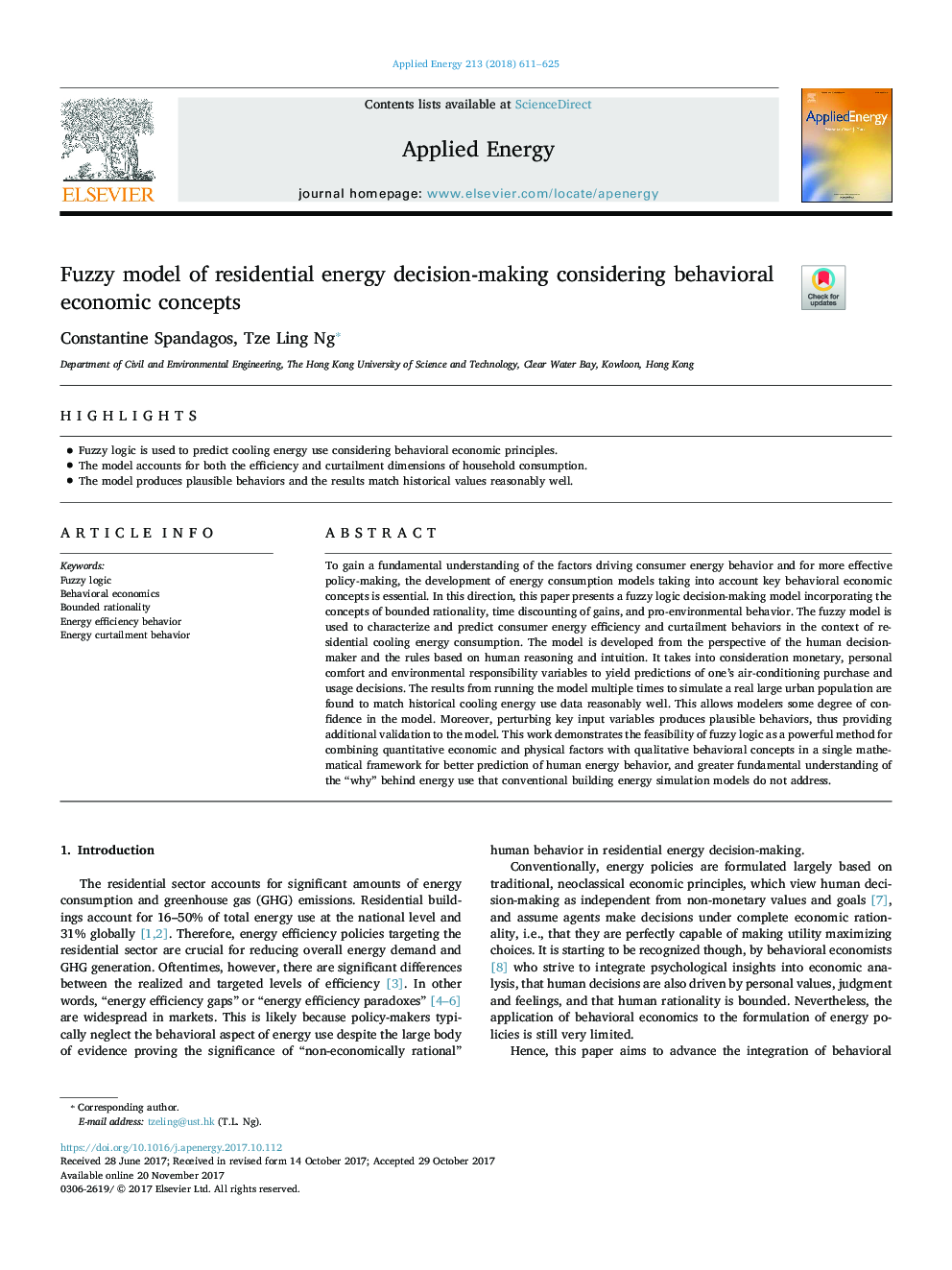| کد مقاله | کد نشریه | سال انتشار | مقاله انگلیسی | نسخه تمام متن |
|---|---|---|---|---|
| 6680853 | 1428077 | 2018 | 15 صفحه PDF | دانلود رایگان |
عنوان انگلیسی مقاله ISI
Fuzzy model of residential energy decision-making considering behavioral economic concepts
ترجمه فارسی عنوان
مدل فازی تصمیم گیری انرژی مسکونی با در نظر گرفتن مفاهیم اقتصادی رفتاری
دانلود مقاله + سفارش ترجمه
دانلود مقاله ISI انگلیسی
رایگان برای ایرانیان
کلمات کلیدی
منطق فازی، اقتصاد رفتاری، عقلانیت محدود، رفتار مصرف انرژی، رفتار محدود کردن انرژی،
ترجمه چکیده
برای به دست آوردن درک اساسی از عوامل موثر بر رفتار مصرف انرژی و سیاست گذاری موثرتر، توسعه مدل های مصرف انرژی با در نظر گرفتن مفاهیم اقتصادی کلیدی رفتاری ضروری است. در این راستا، این مقاله یک مدل تصمیم گیری منطقی فازی ارائه می دهد که شامل مفاهیم عقلانیت محدود، تخفیف زمانی سود و رفتارهای محیط زیستی است. مدل فازی برای توصیف و پیش بینی راندمان مصرف انرژی مصرفی و رفتارهای محدود شدن در زمینه مصرف انرژی خنک کننده مسکونی استفاده می شود. این مدل از منظر تصمیم گیرنده انسانی و قوانین مبتنی بر استدلال و شهود انسان است. این به لحاظ کیفی، راحتی شخصی و متغیرهای مسئولیت زیست محیطی برای پیش بینی تصمیم گیری خرید و تصمیم گیری در مورد تهویه مطبوع در نظر گرفته می شود. نتایج حاصل از اجرای مدل چندین بار برای شبیه سازی یک جمعیت واقعی شهری بزرگ، منطبق با دادههای مصرف انرژی خنک کننده تاریخ منطبق است. این به مدلسازان اجازه می دهد برخی از اعتماد به نفس را در مدل داشته باشد. علاوه بر این، تحریک متغیرهای ورودی کلیدی رفتارهای قابل قبول را ایجاد می کند، بنابراین اعتبار اضافی به مدل ارائه می شود. این کار امکان منطق فازی را به عنوان یک روش قدرتمند برای ترکیب عوامل کمی اقتصادی و فیزیکی با مفاهیم رفتاری کیفی در یک چارچوب ریاضی یکپارچه برای پیش بینی بهتر رفتار انرژی انسانی و درک فزاینده ای از یک وهی نشان می دهد. پس از استفاده از انرژی، مدل های شبیه سازی انرژی متعارف، به آن پاسخ نمی دهند.
موضوعات مرتبط
مهندسی و علوم پایه
مهندسی انرژی
مهندسی انرژی و فناوری های برق
چکیده انگلیسی
To gain a fundamental understanding of the factors driving consumer energy behavior and for more effective policy-making, the development of energy consumption models taking into account key behavioral economic concepts is essential. In this direction, this paper presents a fuzzy logic decision-making model incorporating the concepts of bounded rationality, time discounting of gains, and pro-environmental behavior. The fuzzy model is used to characterize and predict consumer energy efficiency and curtailment behaviors in the context of residential cooling energy consumption. The model is developed from the perspective of the human decision-maker and the rules based on human reasoning and intuition. It takes into consideration monetary, personal comfort and environmental responsibility variables to yield predictions of one's air-conditioning purchase and usage decisions. The results from running the model multiple times to simulate a real large urban population are found to match historical cooling energy use data reasonably well. This allows modelers some degree of confidence in the model. Moreover, perturbing key input variables produces plausible behaviors, thus providing additional validation to the model. This work demonstrates the feasibility of fuzzy logic as a powerful method for combining quantitative economic and physical factors with qualitative behavioral concepts in a single mathematical framework for better prediction of human energy behavior, and greater fundamental understanding of the “why” behind energy use that conventional building energy simulation models do not address.
ناشر
Database: Elsevier - ScienceDirect (ساینس دایرکت)
Journal: Applied Energy - Volume 213, 1 March 2018, Pages 611-625
Journal: Applied Energy - Volume 213, 1 March 2018, Pages 611-625
نویسندگان
Constantine Spandagos, Tze Ling Ng,
